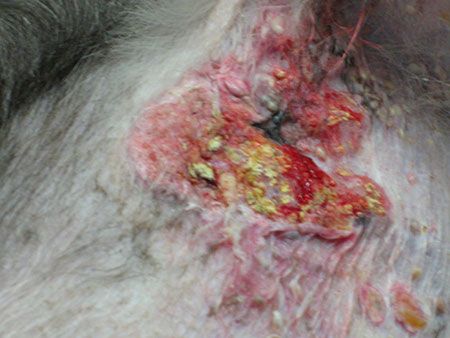Image Quiz: Whats going on with this shih tzus skin?
This pup has a history of chronic allergies but was doing well. What happened?

Image courtesy of Dr. Reeder
Pictured above is the ventral abdomen of a 10-year-old female spayed shih tzu with a history of chronic allergies. The dog had been on allergy shots and was doing well except for some pruritus on the abdomen noted by the owner. The owner obtained a topical product over-the-counter and had been using it two to three times daily.
What's your diagnosis?
a) cutaneous vasculitis
b) Ehlers-Danlos syndrome
c) calcinosis cutis
d) dermatophytosis
Correct answer: “c” calcinosis cutis
This case is one of iatrogenic Cushing's disease created by the topically applied corticosteroid product the owner had been using. Betamethasone was the steroid in the product applied and it can, over time, dramatically thin the ventral abdominal skin. If you look closely, you'll see the “crinkled” and “tissue paper”-like appearance of the skin along with a few small pustules on the margins.
The yellow material seen is actual calcium mineral the body is expelling from the dermis. This is considered to be a dystrophic mineralization of the skin, an idiopathic process. Commonly, Cushing's disease, whether iatrogenic or physiologic, can create this condition. English and French bulldogs along with boxer dogs are overrepresented breeds. The final diagnosis is made via skin biopsies.
Next steps: skin cytology, skin biopsy and test for Cushing's (via an ACTH stimulation or low-dose dexamethasone suppression test). Calcinosis cutis is best treated with managing Cushing's well with appropriate medications (typically trilostane or mitotane). Resolution may take three to six months with a well-controlled Cushingoid patient. Dimethyl sulfoxide solvent gel may be applied topically to help dissolve calcium deposits in the dermis. Though rare, the serum calcium concentration may rise with application of DMSO and may be monitored.
Chris Reeder, DVM, DACVD, practices at BluePearl Veterinary Partners in Franklin, Tennessee. Dr. Reeder's special interests include ear disease and immune-mediated skin diseases. He is an avid hobby farmer raising a large number of critters.